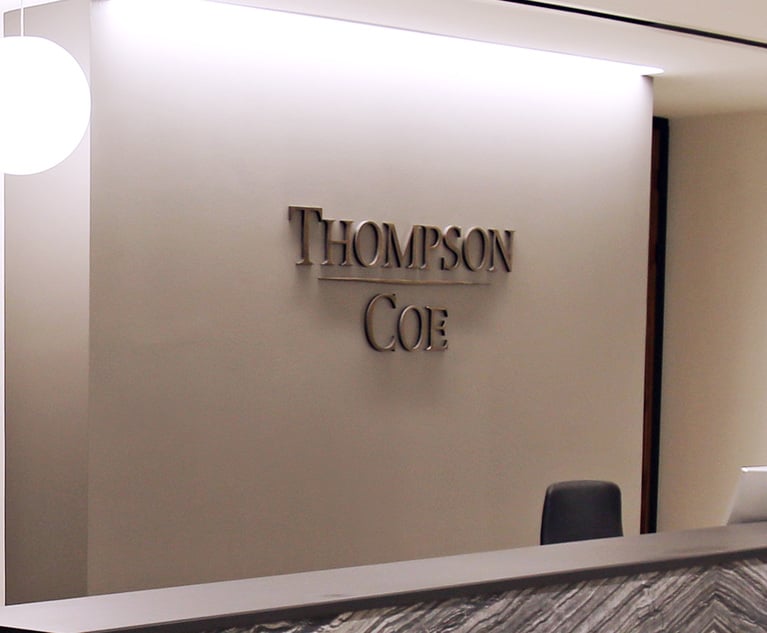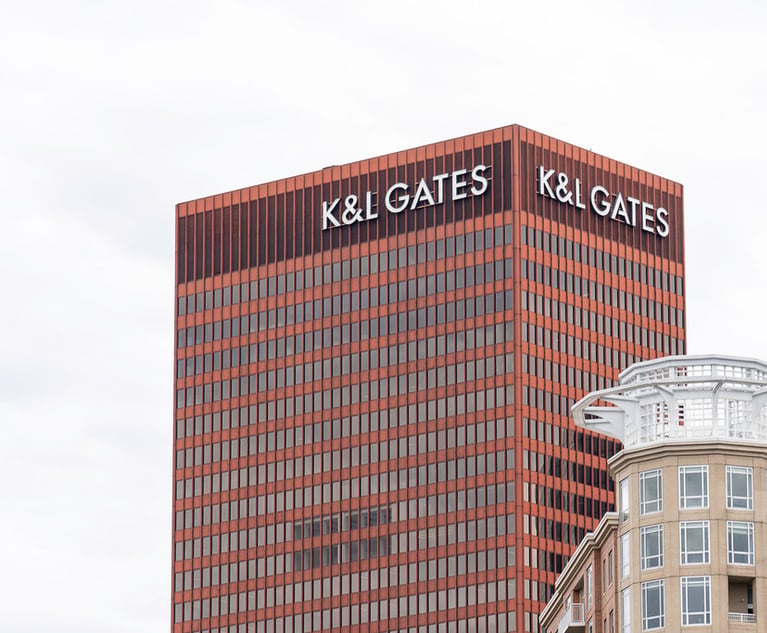Dentons Defends Sprawling Verein Structure, Blasting $32M Malpractice Verdict
The 10,000-lawyer megafirm found its "polycentric" model facing scrutiny in a fight over client conflicts.
February 25, 2020 at 10:08 AM
6 minute read
 Photo: Diego M. Radzinschi/ALM
Photo: Diego M. Radzinschi/ALM
Dentons is vowing to appeal a $32.3 million jury verdict against the megafirm in Ohio, defending the Swiss verein structure that has helped the firm grow to enormous proportions, but that also led to Dentons' disqualification in a patent case five years ago.
The backstory begins at the U.S. International Trade Commission, where an administrative law judge disqualified Dentons in 2015 from representing client RevoLaze, rejecting the firm's contention that its U.S. branch was separate from its Canadian one. The Canadian branch had done legal work for Gap, one of the denim retailers RevoLaze sued for allegedly infringing on one of its patents.
Dentons' disqualification led to RevoLaze suing its former counsel months later. A Cuyahoga County, Ohio, jury on Feb. 13 awarded RevoLaze $32.3 million, which RevoLaze's lawyers at The Patterson Law Firm in Chicago said was the "largest legal malpractice judgment in Ohio history."
But Dentons struck a defiant tone in a statement, pointing out that the ITC later vacated the administrative law judge's findings.
"We will appeal. The verdict was simply wrong. Just as our position was vindicated on appeal by the International Trade Commission, we will be vindicated on appeal in this matter," the global law firm said in a statement.
Dentons has long touted its self-described "polycentric" model, in which the firm has expanded its footprint to more than 10,000 lawyers in 75 countries through combinations and associations with local firms, rather than formal mergers. Like several other large, global firms, it has employed a Swiss verein structure, in which the firm's finances are separated but its branding and strategy are united.
The tension between Dentons' unified brand and diffuse legal structure didn't sit well with ITC Chief Administrative Law Judge Charles Bullock. In May 2015 he agreed with Gap that Dentons US couldn't represent RevoLaze because Dentons Canada had done some work for the retailer.
Dentons argued that under its verein structure its U.S. and Canadian offices were separate entities—they did not share finances nor client files unless they were acting as co-counsel. But Bullock rejected those arguments, noting that Dentons "holds itself out to the public as a single firm."
RevoLaze had to seek new counsel as a result of Bullock's ruling. But RevoLaze found itself under the gun because it had to pay out-of-pocket for some of its legal costs. RevoLaze's patent litigation efforts against Gap and other retailers were being funded by Longford Capital, a litigation financier with offices in Chicago and Dallas, said Kristi Browne, a member of The Patterson Law Firm who represented RevoLaze.
Under its original arrangement, Longford Capital would pay for RevoLaze's legal bills at a certain rate and Dentons agreed to not go over those amounts, essentially ensuring it didn't have to pay out-of-pocket for the litigation, Browne said. But Longford Capital imposed tighter restrictions on how much could be spent on such things as discovery, and RevoLaze's new counsel didn't agree to those limits, she added.
"They would not be bound by those caps and began to bill in excess," Browne said.
The costs of litigating the case led to Gap and RevoLaze settling their ITC case in August 2015. But Dentons appealed Bullock's ruling. On April 4, 2016, RevoLaze sued Dentons and its now-chairman of its legacy patent litigation practice, Mark Hogge, in Ohio state court, accusing the firm of ignoring a conflict of interest which led to its disqualification. That forced RevoLaze to find new lawyers and settle with Gap for less.
"Up until this point, there was very little law on whether Swiss verein was one law firm or many," Browne said. "A court might not agree with this, that 'we're separate law firms,' which is where I think one of the major failings came in."
Nine days later on April 13, the ITC vacated Bullock's decision. The commission found that Bullock lacked sufficient evidence about how Dentons was structured. But because the case had already been resolved, the ITC vacated it "without deciding whether the disqualification in this investigation was appropriate."
"The commission has decided that the added delay, burdens, and expenses that would be incurred by the parties and the commission in resolving these issues are unjustified given the termination of the investigation as to all respondents," the ITC found.
The jury also did not make any determination about Dentons' structure, the law firm said. The eight-person jury found that Hogge was negligent in his representation of RevoLaze and that his negligence was the "direct cause" of the company's damages.
It wasn't a complete victory for RevoLaze, as the jury found that the company wasn't damaged due to the legal fees it had to pay out after jettisoning Dentons as its counsel or its failure to collect on license payments. Browne speculated that her client could have won more money if the jury had gone the other way.
RevoLaze sought at least $50 million in damages, less than what a Cuyahoga County jury awarded Feb. 13.
"Importantly, the jury was not asked to make any determination regarding our firm's structure or conflicts clearance process and its decision in no way undermines the ITC's reversal of the improper initial disqualification," Dentons said. "The firm has a robust and sophisticated conflict clearing process that has enabled it to open tens of thousands of matters every year without incident."
Dentons on Feb. 20 filed a motion to "maintain the status quo pending the outcome of the anticipated post-judgment motions and during the pendency of their stay request." The firm said there was "no question as to defendants' ability to pay the judgment, given Dentons US's resources and presence throughout the United States."
Read More
Ex-Client Sues Dentons Over ITC Case
Dentons' Verein Status Doesn't Shield It from a Conflict
This content has been archived. It is available through our partners, LexisNexis® and Bloomberg Law.
To view this content, please continue to their sites.
Not a Lexis Subscriber?
Subscribe Now
Not a Bloomberg Law Subscriber?
Subscribe Now
NOT FOR REPRINT
© 2025 ALM Global, LLC, All Rights Reserved. Request academic re-use from www.copyright.com. All other uses, submit a request to [email protected]. For more information visit Asset & Logo Licensing.
You Might Like
View All
KPMG Wants to Provide Legal Services in the US. Now All Eyes Are on Their Big Four Peers



K&L Gates Sheds Space, but Will Stay in Flagship Pittsburgh Office After Lease Renewal
Law Firms Mentioned
Trending Stories
- 1'It's Not Going to Be Pretty': PayPal, Capital One Face Novel Class Actions Over 'Poaching' Commissions Owed Influencers
- 211th Circuit Rejects Trump's Emergency Request as DOJ Prepares to Release Special Counsel's Final Report
- 3Supreme Court Takes Up Challenge to ACA Task Force
- 4'Tragedy of Unspeakable Proportions:' Could Edison, DWP, Face Lawsuits Over LA Wildfires?
- 5Meta Pulls Plug on DEI Programs
Who Got The Work
Michael G. Bongiorno, Andrew Scott Dulberg and Elizabeth E. Driscoll from Wilmer Cutler Pickering Hale and Dorr have stepped in to represent Symbotic Inc., an A.I.-enabled technology platform that focuses on increasing supply chain efficiency, and other defendants in a pending shareholder derivative lawsuit. The case, filed Oct. 2 in Massachusetts District Court by the Brown Law Firm on behalf of Stephen Austen, accuses certain officers and directors of misleading investors in regard to Symbotic's potential for margin growth by failing to disclose that the company was not equipped to timely deploy its systems or manage expenses through project delays. The case, assigned to U.S. District Judge Nathaniel M. Gorton, is 1:24-cv-12522, Austen v. Cohen et al.
Who Got The Work
Edmund Polubinski and Marie Killmond of Davis Polk & Wardwell have entered appearances for data platform software development company MongoDB and other defendants in a pending shareholder derivative lawsuit. The action, filed Oct. 7 in New York Southern District Court by the Brown Law Firm, accuses the company's directors and/or officers of falsely expressing confidence in the company’s restructuring of its sales incentive plan and downplaying the severity of decreases in its upfront commitments. The case is 1:24-cv-07594, Roy v. Ittycheria et al.
Who Got The Work
Amy O. Bruchs and Kurt F. Ellison of Michael Best & Friedrich have entered appearances for Epic Systems Corp. in a pending employment discrimination lawsuit. The suit was filed Sept. 7 in Wisconsin Western District Court by Levine Eisberner LLC and Siri & Glimstad on behalf of a project manager who claims that he was wrongfully terminated after applying for a religious exemption to the defendant's COVID-19 vaccine mandate. The case, assigned to U.S. Magistrate Judge Anita Marie Boor, is 3:24-cv-00630, Secker, Nathan v. Epic Systems Corporation.
Who Got The Work
David X. Sullivan, Thomas J. Finn and Gregory A. Hall from McCarter & English have entered appearances for Sunrun Installation Services in a pending civil rights lawsuit. The complaint was filed Sept. 4 in Connecticut District Court by attorney Robert M. Berke on behalf of former employee George Edward Steins, who was arrested and charged with employing an unregistered home improvement salesperson. The complaint alleges that had Sunrun informed the Connecticut Department of Consumer Protection that the plaintiff's employment had ended in 2017 and that he no longer held Sunrun's home improvement contractor license, he would not have been hit with charges, which were dismissed in May 2024. The case, assigned to U.S. District Judge Jeffrey A. Meyer, is 3:24-cv-01423, Steins v. Sunrun, Inc. et al.
Who Got The Work
Greenberg Traurig shareholder Joshua L. Raskin has entered an appearance for boohoo.com UK Ltd. in a pending patent infringement lawsuit. The suit, filed Sept. 3 in Texas Eastern District Court by Rozier Hardt McDonough on behalf of Alto Dynamics, asserts five patents related to an online shopping platform. The case, assigned to U.S. District Judge Rodney Gilstrap, is 2:24-cv-00719, Alto Dynamics, LLC v. boohoo.com UK Limited.
Featured Firms
Law Offices of Gary Martin Hays & Associates, P.C.
(470) 294-1674
Law Offices of Mark E. Salomone
(857) 444-6468
Smith & Hassler
(713) 739-1250










